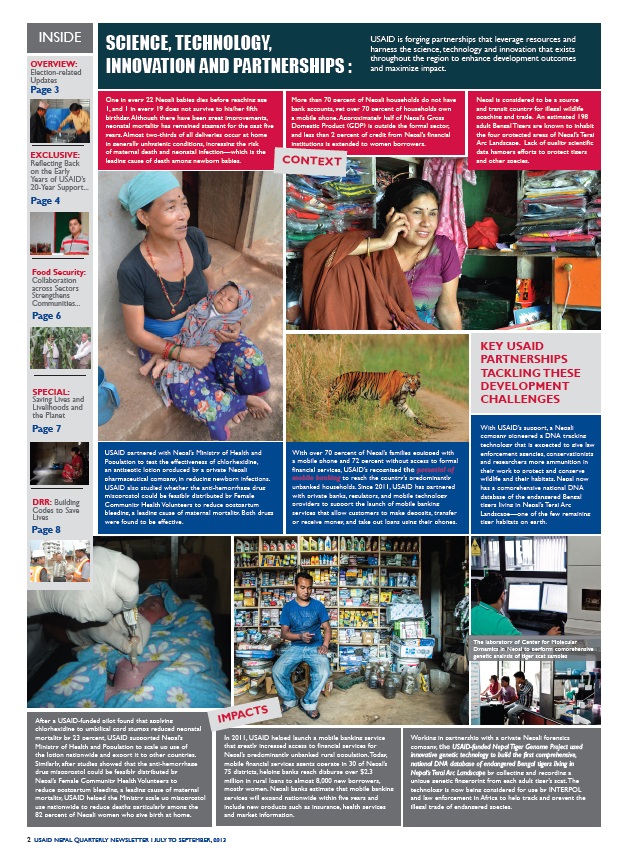Home » Spotlight on Science, Technology, Innovation, and Partnerships
Context:
-
One in every 22 Nepali babies dies before reaching age 1, and 1 in every 19 does not survive to his/her fifth birthday. Although there have been great improvements, neonatal mortality has remained stagnant for the past five years. Almost two-thirds of all deliveries occur at home in generally unhygienic conditions, increasing the riskof maternal death and neonatal infection—which is the leading cause of death among newborn babies.
-
More than 70 percent of Nepali households do not have bank accounts, yet over 70 percent of households own a mobile phone. Approximately half of Nepal’s Gross Domestic Product (GDP) is outside the formal sector, and less than 2 percent of credit from Nepal’s financial institutions is extended to women borrowers.
-
Nepal is considered to be a source and transit country for illegal wildlife poaching and trade. An estimated 198 adult Bengal Tigers are known to inhabit the four protected areas of Nepal’s Terai Arc Landscape. Lack of quality scientific data hampers efforts to protect tigers and other species.
Key USAID Partnerships Tackling These Development Challenges:
-
USAID partnered with Nepal’s Ministry of Health and Population to test the effectiveness of chlorhexidine, an antiseptic lotion produced by a private Nepali pharmaceutical company, in reducing newborn infections. USAID also studied whether the anti-hemorrhage drug misoprostol could be feasibly distributed by FemaleCommunity Health Volunteers to reduce postpartum bleeding, a leading cause of maternal mortality. Both drugs were found to be effective.
-
With over 70 percent of Nepal’s families equipped with a mobile phone and 72 percent without access to formal financial services, USAID’s recognized the potential ofmobile banking to reach the country’s predominantly unbanked households. Since 2011, USAID has partnered with private banks, regulators, and mobile technologyproviders to support the launch of mobile banking services that allow customers to make deposits, transfer or receive money, and take out loans using their phones.
-
With USAID’s support, a Nepali company pioneered a DNA tracking technology that is expected to give law enforcement agencies, conservationists and researchers more ammunition in their work to protect and conserve wildlife and their habitats. Nepal now has a comprehensive national DNA database of the endangered Bengaltigers living in Nepal’s Terai Arc Landscape—one of the few remaining tiger habitats on earth.
Impacts:
-
After a USAID-funded pilot found that applying chlorhexidine to umbilical cord stumps reduced neonatal mortality by 23 percent, USAID supported Nepal’s Ministry of Health and Population to scale up use of the lotion nationwide and export it to other countries. Similarly, after studies showed that the anti-hemorrhage drug misoprostol could be feasibly distributed by Nepal’s Female Community Health Volunteers to reduce postpartum bleeding, a leading cause of maternal mortality, USAID helped the Ministry scale up misoprostol use nationwide to reduce deaths particularly among the 82 percent of Nepali women who give birth at home.
-
In 2011, USAID helped launch a mobile banking service that greatly increased access to financial services for Nepal’s predominantly unbanked rural population. Today, mobile financial services agents operate in 30 of Nepal’s 75 districts, helping banks reach disburse over $2.3 million in rural loans to almost 8,000 new borrowers, mostly women. Nepali banks estimate that mobile banking services will expand nationwide within five years and include new products such as insurance, health services and market information.
-
Working in partnership with a private Nepali forensics company, the USAID-funded Nepal Tiger Genome Project used innovative genetic technology to build the first comprehensive, national DNA database of endangered Bengal tigers living in Nepal’s Terai Arc Landscape by collecting and recording a unique genetic fingerprint from each adult tiger’s scat. The technology is now being considered for use by INTERPOL and law enforcement in Africa to help track and prevent the illegal trade of endangered species.
Date
Friday, November 22, 2013 - 3:45am








Comment
Make a general inquiry or suggest an improvement.